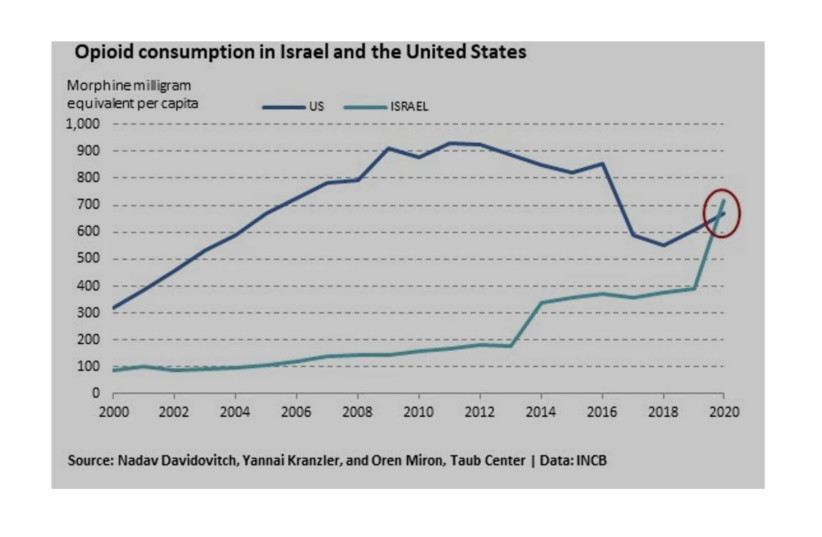Israel overtook the US in 2020 in the consumption of pain-relieving narcotics, including fentanyl, which is 50 times stronger than heroin, a new, 13-page, in-depth study at Jerusalem’s Taub Center for Social Policy Studies has reported, indicating a worrying trend.
Written by Prof. Nadav Davidovitch, Dr. Yannai Kranzler and Oren Miron, the report presents the hard facts of pain narcotic consumption and its destructive effects.
The researchers suggest immediate actions to be taken to cut consumption and the use of more medicine than clinically necessary, including safer alternatives for managing pain, improved accessibility to medical treatment, mental health and social services, and reducing the stigma connected to the use and abuse of drugs.
International studies have shown that opioid consumption by outpatients is usually seen in younger patients who do not have serious conditions or illnesses. The studies also found that since 2014, most of the increase in opioid consumption occurred among patients with a low socioeconomic status; meaning that young, healthy and poor Israelis are among those contributing to the increased consumption of opioids.
In 2012, in the US, where the phenomenon reached epidemic proportions, 80,000 people died from opioid overdoses. Israel has not yet reached this level, but due to religious restrictions, Israel has one of the lowest autopsy rates among developed countries, so it’s hard to detect deaths from opioids or to spot the signs of an epidemic in time, the authors stressed.

Drowsiness, confusion, nausea, constipation and life-threatening respiratory depression are just some of the negative effects of opioid abuse. Long-term opioid abuse causes the body to develop high tolerance levels and a need for increased dosage beyond the original prescription level.
Without appropriate responses by the healthcare system and a supportive social environment, this need could lead to abuse and the search for illicit drugs, which in turn increases the likelihood of overdose and death. In addition, unsupervised opioid withdrawal can expose the body to difficult withdrawal symptoms.
Why has Israel seen an increase in opioid consumption?
Until 2011, Israel had a relatively low rate of consumption of prescription opioids due to its low use of strong opioids (defined as morphine or stronger) such as oxycodone and fentanyl. At the time, Israel relied instead on opioid alternatives and on weaker opioids such as propoxyphene and codeine.
Then, Israel banned the use of propoxyphene due to rare cardiological side effects at high doses, and, in 2014, placed limits on the use of codeine. During these years, there was an increase in the use of the strong opioids oxycodone and fentanyl, and, since 2014, there has been a sharp rise in the use of the latter.
The researchers recommended that the health authorities study other countries that have seen the worst opioid crises- such as the US and Canada - and adopt the best practices they developed and implemented successfully.
They recommend establishing safe protocols for prescriptions, the immediate reduction in the number of unnecessary prescriptions for fentanyl, expanding treatment and checks for abuse, cooperation among organizations and increased accessibility to social assistance.
An additional policy step worthy of advancement would be to include fentanyl in regular drug screening. In the US, when testing for fentanyl was added to screening tests, it was found to be responsible for the majority of drug overdoses. For example, in 2019, over 80% of the screening tests for fentanyl in the State of Maryland were found to be positive.
In 2016, the Israel Medical Association (IMA) released recommendations to prevent unwarranted opioid prescriptions and treat opioid addiction, but these solutions were also not implemented, and were not integrated into clinical practice, the team wrote.
“Learning from the implementation challenges of the 2003 and 2016 recommendations, we suggest a simple and cost-free improvement to the notification settings of the existing clinical prescription software ‘Clicks.’ Software is currently set to notify clinicians when they prescribe counterindication for allergies. We recommend that the health funds add a notification for fentanyl prescriptions that are not indicated by the patient’s condition.”
How can Israel fight a developing opioid crisis?
The most vulnerable sectors could be protected from addiction and from the harm caused by opioid misuse with improved surveillance both of opioid prescriptions and adverse outcomes such as Opioid Use Disorder and overdoses. The improved surveillance would be carried out through the use of publicly available, near-real-time data related to prescription drug use.
The number of autopsies in the case of suspected deaths due to substance abuse should be raised, they wrote, and mortality-review committees should be set up. The availability of electronic health records places Israel at an advantage over the US for monitoring patients’ prescription and medical histories, which can be used to inform decision-making, especially for those most vulnerable to addiction, they added.
Safer prescription practices – including appropriate use of fentanyl substitutes and alternatives for opiate-based medications, particularly among high-risk patients by using prescription-drug-monitoring systems to inform doctors and administrators in hospitals, health fund clinics and pharmacies, as well as educators – should be instituted.
“Those activities cited in our research, along with consciousness-raising in the public regarding the use of medications and addiction, can contribute to reducing the stigma and encouraging the use of non-addictive alternatives.
What is needed is an integrated program on the national level, said Davidovitch, who is chairman of Taub’s Health Policy Program and director of the School of Public Health in the Faculty of Health Sciences at Ben-Gurion University of the Negev (BGU) in Beersheba.
“Only in this way can we hope to reduce the destructive results of rising opioid consumption and its concomitant mortality, and give better treatment to those with the greatest need.”
The Taub Center for Social Policy Studies in Israel is an independent, non-partisan socioeconomic research institute that provides decision-makers and the public with research and findings on some of the most critical issues facing Israel in the areas of education, health, welfare, labor markets and economic policy to advance the well-being of all Israelis.
